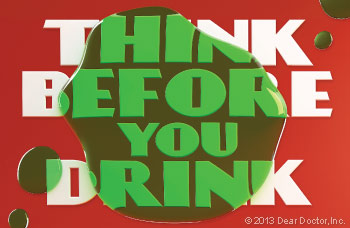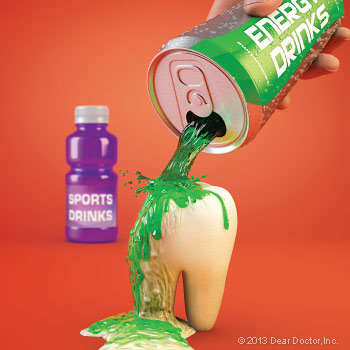Think Before You Drink
Sports And Energy Beverages Bathe Teeth In Erosive Acids

Advertisements for energy drinks are everywhere — particularly where extreme sports are played, watched, or even talked about online. If you believe the marketing hype — and many teenagers do — these caffeinated, sugary drinks can give you more vitality, better mental focus and an enhanced athletic performance. One company even goes so far as to claim its product “enhances your overall well-being.” Based on the research concerning energy drinks and teeth, nothing could be further from the truth.
My colleagues and I recently found that due to their acidity, energy drinks — and to a lesser, but still significant extent, sports drinks — strip away the protective enamel layer of teeth. This leaves the teeth vulnerable to hypersensitivity, decay and irreversible damage. It's something everyone should be aware of. So let's begin by talking about what energy and sports beverages actually are.
Strange Brew

Sports and energy drinks are significantly different from each other, though surveys show consumers often confuse the two. Both, however, have citric and sometimes other acids added to them to improve taste and shelf life. The acidity of these drinks has a major impact on tooth enamel.
Sports drinks, which were introduced in the late 1960s, are designed to rehydrate the body while replenishing carbohydrates and electrolytes lost during rigorous physical exercise. Examples include Gatorade® and Powerade®, which are mostly water, sugars, salts and acids. They may also contain certain vitamins.
Energy drinks, on the other hand, were created to boost energy, athletic performance, and (mental) concentration. They are highly caffeinated and acidic. They also usually contain sugar, vitamins, and plant extracts including guarana — a botanical source of caffeine. Because manufacturers label these beverages as “dietary supplements,” they are not regulated by the Food and Drug Administration (FDA), as sports drinks and sodas are. The first energy drink was Red Bull®, which came on the U.S. market in 1997. Other examples are Monster Energy® and 5-Hour Energy®.
Approximately 30-50% of U.S. adolescents and young adults consume energy drinks and 51-62% of adolescents consume at least one sports drink per day.
Consumption of both sports and energy drinks has been on the rise, especially among the children and adolescents to whom these beverages are aggressively marketed. Approximately 30-50% of U.S. adolescents and young adults consume energy drinks and 51-62% of adolescents consume at least one sports drink per day, surveys show. Many people mistakenly believe that these drinks are somehow “healthier” than soda. My research goal was to find out if this is in fact true.

